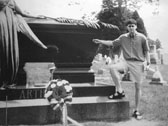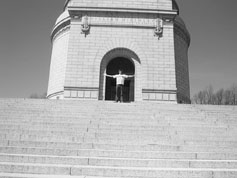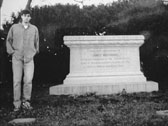All the Presidents' Pets (2 page)

2
Some Background on How I Became Jim Traficant's Bitch
Â
Maybe I was overly sensitive to taunts from network people. After all I'd once been at network, before I “transitioned” to cable.
For years I'd dutifully filed quirky reports for the CBS
Early Show,
which every TV critic described as “the long-suffering
Early Show.”
(Most of those writers had assigned the phrase its own F-key.) My beat included everything from a behind-the-scenes look at
Survivor: East Timor
to a whatever-happened-to look at the contestants from
Survivor: Chechnya.
When our executive producer forced me to serve as an usher for the
Early Show
's on-air weddingâin which the groom had been married once before on NBC's
Toda
yâ
I knew it was time to leave.
The ratings were one problem. One week, when
Today
was in Los Angeles and ABC's
Good Morning America
was in London, we pulled out all the stops. Cohosts Harry Smith, Hannah Storm, Julie Chen, and René Sylerâ“Harry and his harem,” the crew used to snickerâand I put on grass skirts and brandished tiki torches for our own game of
Survivor: Early Show.
But the only person who stopped to look through the windows of our street-side plaza was a homeless man with no pants. Worse still, our ratings actually dropped when the five of us underwent simultaneous colonoscopies.
More important, I wanted to be a political reporter. I looked at Jeff Greenfield, the brainiac who left ABC's
Nightline
for CNN so that he could do even more hard news. The network-for-cable gamble had paid off for him. Why not me? Yes, MSNBC was in fourth place among the three main twenty-four-hour news channels (Nielsen stood by its figures), but it was better than Oxygen, the only other cable outlet that gave me an offer. And so, in a very small way, I was on my way.
My goal was, had been for a long time, to cover the White Houseâthe big kahuna among political assignments. Since childhood I'd had a deep, even romantic, fascination with all things presidential. (More on that later.) MSNBC's then-president Eric Sorenson wouldn't promise me that primo beat right off the bat. “We're in a state of flux right now,” he explained. “But don't worry, we're in the Mo Rocca business for the long haul.”
When I signed my contract, though, Eric surprised meâbut not with the White House. “We want to try something alternative with you, Mo.” I was a funny guy, he said, and that could play with a younger demographic. “MSNBC's mission from the beginning has been to harness the current-events curiosity of young, hip viewers. That means being serious and sexy and not talking down to them.” The only thing vaguely sexy about that so-called mission statement was the word “harness,” but I was intrigued. Eric continued: “Our studies have shown that Generation Z is hungry for news, but they just don't trust the âthree wise men'âyou know, Tom, Dan, and Peter. You can be an ambassador, Mo.” I was bewildered but flattered, too, by the notion that I could be a bridge to disaffected hipsters everywhere.
Thus was born MSNBC's
Rocca Your World,
a platform for me to ask the questions of politicians and lobbyists that everyone wanted to ask but wouldn't. I would be the television journalism world's id.
To run the show MSNBC brought in a twenty-five-year-old former production assistant from HBO's acclaimed
Da Ali G Show.
Everyone was duly impressed by Seamus. He had never finished college, he played the drums in his own jam band,
and
he'd once been named as a defendant in an online music-file-sharing suit. “This guy's really in touch,” said Eric knowingly.
Tall and lanky, with a tousled head of red hair, uniformed in brown Wrangler cords, a Willy Wonka T-shirt that was three sizes too small, and a pair of Vans on his feet, Seamus looked like he'd skateboarded right off a
Vice
magazine shoot. Every time he skidded into our studio in Secaucus, New Jersey, a frisson of excitement whipped through the newsroom. “We're going to take your grandpop's newscast and flip it inside out, Moises,” Seamus decreed. “Kids will dig it because they'll know you're winking at 'em the whole time. Solid?”
I wasn't. But I didn't want to be difficult, so when Seamus decided I needed a new look, I went along. I stopped cutting, washing, or combing my hair and borrowed money from my parents to buy a Juicy brand velour track suit and a pair of Chuck Taylor All-Stars. Seamus even convinced me to get “Murrow” tattooed on my left shoulder. But when the two of us came back with blue-tinted Samuel L. Jackson frames for me, Eric overruled us. “The look may be cool, Seamus, but the audience has got to see his eyes. Standards and practices.”
Seamus put his arm around me and confided, “Execs need to feel like they're part of the creative process. Let's say we give ground on this one, Mo-meister, aiiight den?” Uh, sure. It's not like we had a choice. Eric suggested we call former MSNBC correspondent Ashleigh Banfield, famous for her sexy eyewear, for another direction on specs. I'd never actually met Ashleigh, but Seamus had once made out with her at a Radiohead concert, so he did the talking.
Ashleigh was now reporting for ANN, the Arctic News Network. For the past two months she'd been busy reporting on preparations for Alaska's Iditarod sled dog race. After that she was scheduled to spend another two months covering potential Iditarod fallout, before gearing up to report on next year's Iditarod. Somehow she found time to take Seamus's call.
She referred us to Selima Optique, a pricey eyeglasses shop in SoHo. Within days I was sporting a pair of chunky electric green ultra-Teutonic frames, trendier than anything architect Daniel Libeskind could dream up.
I was undeniably stylin', and yet I just didn't feel like me. But Seamus was absolutely confident. My first guest was Republican rocker Ted Nugent. He and I were to debate gun control as we played with G.I. Joes. “Right out of the gates we're going way post-ironic,” said Seamus during our prep.
It went surprisingly well. During the segment Nugent got so carried away making his own artillery sounds that viewers must have at the very least been mystified. I asked Seamus if I'd handled it okay. “Fo' shizzle, my nizzle!” he exclaimed in his best wigger voice. He wrapped his arm around my neck and gave me a noogie. When NBC News president Neal Shapiro called to say he was “amused”âin retrospect, I think he said “bemused”âa cheer went up in the studio. (In fairness to Neal, we spent little time talking about gun control. Seamus felt that that would have been too obvious.)
After the show Seamus brought the whole staff out for a round of Schlitz. (Pabst Blue Ribbon, or PBR, was “yesterday's hip shitty beer,” he said.) He even convinced Eric to wear his trucker cap that night, though by that time trucker hats were overâagainâso Seamus was really just setting Eric up.
It was all pretty heady. For the first time in sixteen years I shotgunned a beer. I also smoked my very first American Spirit cigarette. Seamus dubbed me “Mo King”ânot terribly clever, but we were all so happy we laughed anyway. MSNBC might have a new hit on its slate. That night Seamus sucked face with one of our newsreaders in the bar, even though he said he was dating actress Gina Gershon.
Eric immediately capitalized on this success and got me booked as one of the sassy talking heads on VH1's newest list show,
VH1's 35 Funniest Brunettes.
Was Courteney Cox (#5) really funnier than Joan Cusack (#9)? I didn't think so but I did my snarky best.
This would be the first of many “Mo Rocca branding” ventures, Eric promised. MSNBC's
Mo Rocca the Vote
would inevitably spin off in time for the next presidential election. “You'll make Anderson Cooper wish he'd never left
The Mole,
” gloated Eric.
It was undeniably exciting. I began Googling myself, first once a day, then once every hour or so. Oh my God, I was stalked twice on Gawker in one week! Then Seamus asked one of the MSNBC interns he'd slept with to set up a Yahoo! fan club for me. After two weeks there were still only twelve members, all teenage girls. I hung on every word they typed. Roccandroll43 was the most prolific: “Mo is so pale, skinny, and uncomfortable with himself. It's adorable!”
But any momentum I might enjoy as a “personality” still depended largely on the success of the show. And alas, the Nugent experience turned out to be a lone bright spot for
Rocca Your World.
Before the month was finished, the political establishment quickly cooled to what Seamus had coined our “anti-newscast.”
“Why am I asking James Baker to play Twister with me?” I asked Seamus before one taping.
“Because you're tweaking the whole former-secretary-of-state convention. The kids'll love it.”
“That doesn't make any sense.”
“The line between what's real and what's not, we're fucking with it. It's satire.” Seamus was becoming less friendly, more agitated. “Bro, you're overthinking it. Sometimes it's just funny.”
Secretary Baker not so graciously declined my invitation, as did most of Washington's powerbrokers past and present. Even Pennsylvania senator Arlen Specter, who had recently shown up on Jay Leno's
Tonight Show
in full clown makeup (he was getting ready for a presidential run in 2008), turned us down.
That's when viewers started fleeing in droves, and the critics smelled blood. The
Washington Post
's Tom Shales wrote that “Rocca is ten minutes past his fifteen minutes of fame” and that I “deserved to die.” The
New York Times
's Frank Rich served me with the harshest indictment of all:
“Rocca Your World
made me cry more than the recent revival of
Gypsy,
and for all the wrong reasons.”
By this time Seamus had become boredâhe had already “embedded” every woman at the networkâand announced that he was moving on to direct a production of
Macbeth
with meth-addicted McDonaldland characters on the Lower East Side.
“We're not connecting here, Mochise. You guys are way too linear.”
Rather than bring in someone to fix the show, the network started eating into my hour. First came extended weather breaks. Then they forced me to make room for “Imus moments,” during which the I-Man was usually blasting away at my show. (Imus was implacable. He returned every check I wrote to his charity ranch.)
I was no safer in cyberspace. On AmIAnnoying.com, I discovered that according to voters I was more annoying than Pia Zadora and only slightly less annoying than Jeffrey Dahmer. My Yahoo! fan site had already shuttered, after the lone remaining member, Roccandroll43, wrote, “Mo is so pale, skinny, and uncomfortable with himself. It really grosses me out.”
What hurt most of all, though, was the treatment I got from Washington's normally good-natured political comedy song-and-dance troupe, the Capitol Steps. Their latest revue,
Please, No Mo Rocca
included the biting “You're the Flop” (sung to the melody of Cole Porter's “You're the Top”), which soon became an even bigger hit than last season's “Bomb Bomb Iraq” (sung to the melody of the Beach Boys' “Barbara Ann”). The lyrics were scathing:
You're the Flop
You're as funny as Cheney
You're the Flop
But not nearly as zany
You're worse than watching roll call on C-SPAN
You're a filibuster
Without the luster
You deserve the can!
That's when Eric pulled the plug on
Rocca Your World
and conceived my “Pressure” segment. “Look, Mo, we might have pushed you too far away from your roots. This will be a much better fit,” Eric said.
“But I came to cable to avoid things like wearing silly disguises.”
“Hey, there's nothing silly about the proud men and women who work in America's service industries,” he said a little self-righteously. “Besides, Jim likes you.”
Hard Time with Jim Traficant,
featuring my “Pressure” segment, would premiere only days later. Traficant had been out of prison for two months when the network snatched him up. Besides my participation, he demanded that he be allowed to wear his orange prison jumpsuit on camera and that Gary Condit be the first guest. (Condit was the only member who voted against Jim's expulsion from the House of Representatives.) The network had high hopes.
I didn't have much choice but to submit to Traficant, so I packed my bags and moved down to D.C., the town where I grew up and where the show was being taped.
Back in the café car, stinging from Lesley Stahl's barbs, I sucked it up and committed myself to soldiering onward. Phil was still watching Bush dropping Barneyâfrom three news angles now and with on-air analysis from Bill Schneider.
“So, Phil,” I said optimistically, “I figured since we're here, we may as well get a few sound bites from the conductor on the status of the split in the track outside Metropark. It could become a big story.”
Phil shot me a look of unalloyed contempt. I whimpered.
3
There's Something About Harry
(and all our other presidents)
The only good part about being back in Washington was that I'd be near the White House. And the White House is where the President lives. Allow me to digress for a moment . . .
The President. The Commander-in-Chief. The Chief Executive. POTUS. Maybe I was fascinated by the office because I'd been raised in D.C., a mill town like L.A., where the President was the undisputed number-one star. Other kids might have become blasé but not I. Staring at the White House was magical, like looking through the gates of Paramount Studios.
It seemed that the office had worked a kind of alchemy on all its forty-two occupants. (George W. Bush is the forty-third President because Grover Cleveland's nonconsecutive terms are counted twice.) In each case, the presidency took a man who seemed ordinary and transformed him into something more. Silent Cal Coolidge was no longer boring; he was stoic. Taft was no longer fat; he was robust. Clinton was no longer an adulterer; he was popular with women voters. Even George Washington, already a god among men, grew still larger than life in office. Had he never been President, he would have still been “First in War,” maybe even “First in the Hearts of his Countrymen.” But without the “First in Peace” part, the whole quote would have fallen apart.
Cynics believed that a presidential mythmaking machine was at work, serving the American public's need, in the absence of royalty, to believe, say, that Warren Harding was a 1920s Abe Lincoln. (Warren Harding did have the biggest feet of any presidentâsize fourteen and a half. That has to count for something.) They believed that the White House press corps aided and abetted this myth.
Perhaps it was no coincidence that the first modern all-powerful President, Teddy Roosevelt, had an especially close relationship with reporters and gave them their first pressroom inside the White House. He did this, the skeptics claimed, so that he could manage the flow of information more easily and control the way the American people perceived him.
But honestly, could anyone deny that TR
was
nearly superhuman? Through a hail of bullets this former asthmatic ran all the way up Cuba's Kettle Hill without stopping for breath. (That's right, Kettle Hill. San Juan Hill gets all the credit, but it was a lot less important.) This was no whitewashing.
Sure, the press might have been tricked or bullied by the White House on occasion. In
The Boys on the Bus,
journalist Timothy Crouse described the Nixon-era White House press corps members as flacks, called them “handout artists.” But ever since Watergate, Presidents were picked apart from A to Z, and former Presidents were constantly reassessed. The Starr Report was excessive in book form. Did it really need to be put out as a book on tape? Though I suppose David Ogden Stiers's narration did help class it up.
And still my faith and, yes, awe in the transformative power of the office remained intact. Look at George W. Bush: The
New York Times
's Frank Bruni, whom the President nicknamed “Panchito,” described a likable Bush “ambling” into office in January 2001. Nine months later, and only a week after 9/11, Bush stood atop the smoldering rubble of Lower Manhattan and rallied the nation. At the time, Bob Woodward (nickname “Woody”) compared Bush favorably with FDR. Not long afterward Chris Matthews (nickname “Sugarlips”) called him “an easygoing Prince Hal transformed by instinct and circumstance into a warrior King Henry.” America (nickname “The Big Enchilada”) and I were once again impressed.
Most wondrous of all, anyone could still become President. Ronald Reagan started out life dirt poor. Critics minimized his achievement and said that his status in Hollywood had given him a leg up. Status?
Hellcats of the Navy
should have consigned Ron and Nancy to three years in the brig, minimum. But in America, anyone with Reagan's talent to lead had a shot at becoming President. Sure it helped if you were white, male, and Protestant (or like a Kennedy, Protestant-ish), but there were still a bunch of those.
But it wasn't just the marquee presidents I revered. I had a special fondness for the forgotten Chief Executives.
While some kids were into sports stars, I was into James Buchanan and Franklin Pierce, the Presidents you couldn't remember were actually Presidents. The majority served during a relatively low point in presidential power, between Lincoln and Teddy Rooseveltâdisproportionately from Ohio, targets of crazed anarchists, with lots of facial hair. (With his muttonchops, Chester Alan Arthur was hipper than Seamus could ever hope to be.)
My penchant for Presidents big and small found a new outlet when I began visiting presidential homes and gravesites. It was the perfect hobby for someone who'd never had a real hobby. (Memorizing all the world capitals wasn't really a hobby, though things did get sort of hectic after the breakup of the old Soviet Union.)
The visits began about five years ago. I was driving through the Hudson Valley on the way home from visiting my grandmother when I saw a sign for eighth President Martin Van Buren's house in Kinderhook, New York. Lindenwald, as it is known, which is Dutch for “grove of trees,” was modeled after a Venetian villa and still had its original Zuber-designed wallpaper depicting vivid scenes of Alsatian stag hunting and wild fowling. My tour guide was a way-too-cool-for-school college student named Sari Van Buren. “Are you related?” I asked. “Uh, yeah,” she said, doing her best popular-girl-answering-a-lame-question voice. “And, like, please don't lean on the sideboard. It's a period piece.”
Perhaps it was Sari's grossed-out description of her foppish ancestor's Wedgwood china chamber pot, or maybe it was the way she mispronounced
poudreus
eâ
why the President had his own eighteenth-century French vanity I'll never knowâbut gradually my hobby became an obsession.
After a trip to the Grover Cleveland birthplace in Caldwell, New Jerseyâthe collection included a piece of his inaugural fruitcakeâI rented a car and headed to the Midwest, land of the forgotten Presidents. At the Benjamin Harrison house in Indianapolis I tagged along with a group of restless fourth-graders led by volunteer Wanda Wheeler, a seventy-five-year-old battleax in a full Victorian gown who sounded exactly like Granny Clampett from
The Beverly Hillbillies.
It was 97 degrees outside and not much cooler inside, and I half expected one of the boys to grab “Little Ben's” flintlock pistol and turn it on Wanda. But Wanda was a lesson in the persuasive power of fanaticism.
“Now LOOK at that Reginaphone!” she barked, pointing to the phonograph's precursor (rhymes with vagina-phone). “Have you ever seen a Reginaphone like that?” she asked. “NO YOU HAVEN'T!” she snapped before anyone could answer. “Now LOOK at that Hoosier kitchen cabinet,” she ordered us. “Have you ever seen a Hoosier kitchen cabinet like that? NO YOU HAVEN'T!” In fact I had, at William Henry Harrison's estate in Vincennesâwhich also had an exquisitely crafted pie safeâbut I was afraid to interrupt her.
 Â
 
 Â
 
Visiting with some of my oldest friends. Clockwise from top left: Chester Alan Arthur, William Howard Taft, James Buchanan, and William McKinley.
By the end of the tour the kids were fresh converts to her Benjamin Harrison cult. Forget the critics who had called him a “study in inaction” with a handshake like a “wilted petunia.” The kids now understood that the twenty-third President was a virile and fearless leader. It was agreed that the time had come to sandblast Mount Rushmore and replace it with Benjamin Harrison. (As for the boy in the Colts jersey who begged Wanda to let him touch Caroline Harrison's whalebone bristle brush, the change was even more profound.)
Did Wanda go too far? Perhaps. Few scholars would agree that Harrison freed the slaves. But the fact remained that he deserved much more respect than he had been given.
As for the gravesites, it seemed fair that the less ballyhooed Presidents had the more extravagant tombs. Jogging up the 108 steps of the McKinley Memorial I felt like Rocky, though I realize that my jumping and fist-pumping upon reaching our twenty-fifth President's Windsor green granite sarcophagus was wholly inappropriate, and I now offer profuse apologies to the McKinley estate.
When I wasn't visiting homes and gravesites I was reading about everything presidential. Mothers, siblings, cars, major medical operations. (George Washington did not in fact have wooden teeth. Grover Cleveland did have a rubber jaw.) And the First Lady flashcards my grandmother had given me long ago were rarely out of reach.
My colleagues at the
Early Show
took note of my fixations. They suspected that I was suffering from a major First Void in my life.
“I think you need to ask yourself why you're so interested in all these dead guys,” anchor Harry Smith counseled me over lunch one day in the CBS commissary.
“Harry, with all due respect, you're the guy who hosts
Biography.
”
“I'm concerned, that's all. Besides, many of
Biography
's subjects are alive.”
“So you'd prefer I hang around outside Angie Dickinson's house?” I asked, a bit sarcastically I'm afraid.
“And you wonder why you're not covering the White House for CBS,” Harry snapped. “Asshole.”
BUT EVEN LOOKING BACK
from my current low point, I knew I'd made the right move. I still stood a greater chance of covering the White House for MSNBC than I ever had at CBS. And that made all the difference: Reporters who covered the White House performed a great service to today's publicâand tomorrow's. After all, as
Washington Post
publisher Philip Graham put it, journalism is “the first draft of history.” (Yes, someday historians would pore over old issues of
Maxim.
)
As the cab passed the Kennedy Center en route to my apartment, I thought of JFK and how, according to Robert Dallek's recent biography, he'd suffered more than anyone had ever known. I hated physical pain so I counted myself lucky. Gluing on a fake mustache only hurt emotionallyâthough taking it off did kind of burn.